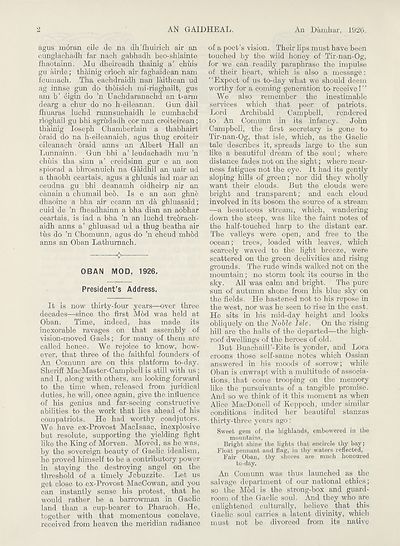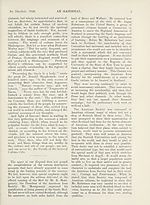‹‹‹ prev (9)
Earrann [Part] 1, An Dàmhar [October], 1926![Earrann [Part] 1, An Dàmhar [October], 1926](https://deriv.nls.uk/dcn4/1252/9739/125297390.4.jpg)
Download files
Complete book:
Individual page:
Thumbnail gallery: Grid view | List view

2
AN GAlDHEAL.
An Bamhar, 1920.
agus moran eile de na dh’fhuirich air an
cunglachadh far nach gabhadh beo-shlainte
fhaotainn. Mu dheireadh tbainig a’ chuis
gu airde; thainig crioch air faghaidean nam
feumach. Tha eachdraidh nan laithean ud
ag innse gun do thoisich mi-riaghailt, gus
am b’ ^igin do ’n Uachdaranacbd an t-ann
dearg a chur do no h-eileanan. Gun d&il
fhuaras lucbd rannsuchaidh le cumhachd
rioghail gu bbi sgrudadh cor nan croiteirean;
thainig Joseph Chamberlain a thabhairt
braid do na h-eileanaich, agus thug croiteir
eileanach braid anns an Albert Hall an
Lunnainn. Gun bhi a’ leudachadh mu ’n
chuis tha sinn a’ creidsinn gur e an aon
spiorad a bhrosnuich na Gbidhil an uair ud
a thaobh ceartais, agus a ghluais iad mar an
ceudna gu bhi deanamh oidheirp air an
canain a chumail beb. Is e an aon ghne
dhaoine a bha air ceann an da ghluasaid;
cuid de ’n fheadhainn a bha dian an aobhar
ceartais, is iad a bha ’n an luchd trebrach-
aidh anns a,’ ghluasad ud a thug beatha air
tus do ’n Chomunn, agus do ’n cheud mhbd
anns an Oban Lathumach.
<>
OBAN MOD, 1926.
President’s Address.
It is now thirty-four years—over three
decades—since the first Mbd was held at
Oban. Time, indeed, has made its
inexorable ravages on that assembly of
vision-moved Gaels; for many of them are
called hence. We rejoice to know, how¬
ever, that three of the faithful founders of
An Comunn are on this platform to-day.
Sheriff MacMaster-Campbell is still with us;
and I, along with others, am looking forward
to the time when, released from juridical
duties, he will, once again, give the influence
of his genius and far-seeing constructive
abilities to the work that lies ahead of his
compatriots. He had worthy coadjutors.
We have ex-Provost Maclsaac, inexplosive
but resolute, supporting the yielding fight
like the King of Morven. Moved, as he was,
by the sovereign beauty of Gaelic idealism,
he proved himself to be a contributory power
in staying the destroying angel on the
threshold of a timely Jebuzzite. Let us
get close to ex-Provost MacCowan, and you
can instantly sense his protest, that he
would rather be a barrowman in Gaelic
land than a cup-bearer to Pharaoh. He,
together with that momentous conclave,
received from heaven the meridian radiance
of a poet’s vision. Their lips must have been
touched by the wild honey of Tir-nan-Og,
for we can readily paraphrase the impulse
of their heart, which is also a message:
“Expect of us to-day what we should deem
worthy for a coming generation to receive! ’ ’
We also remember the inestimable
services which that peer of patriots,
Lord Archibald Campbell, rendered
to An Comunn in its infancy. John
Campbell, the first secretary is gone to
Tir-nan-Og, that isle, which, as the Gaelic
tale describes it, spreads large to the sun
like a beautiful dream of the soul; where
distance fades not on the sight; where near¬
ness fatigues not the eye. It had its gently
sloping hills of green; nor did they wholly
want their clouds. But the clouds were
bright and transparent; and each cloud
involved in its bosom the source of a stream
—a beauteous stream, which, wandering
down the steep, was like the faint notes of
the half-touched harp to the distant ear.
The valleys were open, and free to the
ocean; trees, loaded with leaves, which
scarcely waved to the light breeze, were
scattered on the green declivities and rising
grounds. The rude winds walked not on the
mountain; no storm took its course in the
sky. All was calm and bright. The pure
sun of autumn shone from his blue sky on
the fields. He hastened not to his repose in
the west, nor was he seen to rise in the east.
He sits in his mid-day height and looks
obliquely on the Noble Isle. On the rising
hill are the halls of the departed—the high-
roof dwellings of the heroes of old.
But Buachaill’-Eite is yonder, and Lora
croons those self-same notes which Ossian
answered in his moods of sorrow; while
Oban is enwrapt with a multitude of associa¬
tions, that come trooping on the memory
like the pursuivants of a tangible promise.
And so we think of it this moment as when
Alice MacDonell of Keppoch, under similar
conditions indited her beautiful stanzas
thirty-three years ago:
Sweet gem of the highlands, embowered in the
mountains,
Bright shine the lights that encircle thy bay;
Float pennant and flag, in thy waters reflected,
Fair Oban, thy shores are much honoured
to-day.
An Comunn was thus launched as the
salvage department of our national ethics;
so the Mod is the strong-box and guard-
room of the Gaelic soul. And they who are
enlightened culturally, believe that this
Gaelic soul carries a latent divinity, which
must not be divorced from its native
AN GAlDHEAL.
An Bamhar, 1920.
agus moran eile de na dh’fhuirich air an
cunglachadh far nach gabhadh beo-shlainte
fhaotainn. Mu dheireadh tbainig a’ chuis
gu airde; thainig crioch air faghaidean nam
feumach. Tha eachdraidh nan laithean ud
ag innse gun do thoisich mi-riaghailt, gus
am b’ ^igin do ’n Uachdaranacbd an t-ann
dearg a chur do no h-eileanan. Gun d&il
fhuaras lucbd rannsuchaidh le cumhachd
rioghail gu bbi sgrudadh cor nan croiteirean;
thainig Joseph Chamberlain a thabhairt
braid do na h-eileanaich, agus thug croiteir
eileanach braid anns an Albert Hall an
Lunnainn. Gun bhi a’ leudachadh mu ’n
chuis tha sinn a’ creidsinn gur e an aon
spiorad a bhrosnuich na Gbidhil an uair ud
a thaobh ceartais, agus a ghluais iad mar an
ceudna gu bhi deanamh oidheirp air an
canain a chumail beb. Is e an aon ghne
dhaoine a bha air ceann an da ghluasaid;
cuid de ’n fheadhainn a bha dian an aobhar
ceartais, is iad a bha ’n an luchd trebrach-
aidh anns a,’ ghluasad ud a thug beatha air
tus do ’n Chomunn, agus do ’n cheud mhbd
anns an Oban Lathumach.
<>
OBAN MOD, 1926.
President’s Address.
It is now thirty-four years—over three
decades—since the first Mbd was held at
Oban. Time, indeed, has made its
inexorable ravages on that assembly of
vision-moved Gaels; for many of them are
called hence. We rejoice to know, how¬
ever, that three of the faithful founders of
An Comunn are on this platform to-day.
Sheriff MacMaster-Campbell is still with us;
and I, along with others, am looking forward
to the time when, released from juridical
duties, he will, once again, give the influence
of his genius and far-seeing constructive
abilities to the work that lies ahead of his
compatriots. He had worthy coadjutors.
We have ex-Provost Maclsaac, inexplosive
but resolute, supporting the yielding fight
like the King of Morven. Moved, as he was,
by the sovereign beauty of Gaelic idealism,
he proved himself to be a contributory power
in staying the destroying angel on the
threshold of a timely Jebuzzite. Let us
get close to ex-Provost MacCowan, and you
can instantly sense his protest, that he
would rather be a barrowman in Gaelic
land than a cup-bearer to Pharaoh. He,
together with that momentous conclave,
received from heaven the meridian radiance
of a poet’s vision. Their lips must have been
touched by the wild honey of Tir-nan-Og,
for we can readily paraphrase the impulse
of their heart, which is also a message:
“Expect of us to-day what we should deem
worthy for a coming generation to receive! ’ ’
We also remember the inestimable
services which that peer of patriots,
Lord Archibald Campbell, rendered
to An Comunn in its infancy. John
Campbell, the first secretary is gone to
Tir-nan-Og, that isle, which, as the Gaelic
tale describes it, spreads large to the sun
like a beautiful dream of the soul; where
distance fades not on the sight; where near¬
ness fatigues not the eye. It had its gently
sloping hills of green; nor did they wholly
want their clouds. But the clouds were
bright and transparent; and each cloud
involved in its bosom the source of a stream
—a beauteous stream, which, wandering
down the steep, was like the faint notes of
the half-touched harp to the distant ear.
The valleys were open, and free to the
ocean; trees, loaded with leaves, which
scarcely waved to the light breeze, were
scattered on the green declivities and rising
grounds. The rude winds walked not on the
mountain; no storm took its course in the
sky. All was calm and bright. The pure
sun of autumn shone from his blue sky on
the fields. He hastened not to his repose in
the west, nor was he seen to rise in the east.
He sits in his mid-day height and looks
obliquely on the Noble Isle. On the rising
hill are the halls of the departed—the high-
roof dwellings of the heroes of old.
But Buachaill’-Eite is yonder, and Lora
croons those self-same notes which Ossian
answered in his moods of sorrow; while
Oban is enwrapt with a multitude of associa¬
tions, that come trooping on the memory
like the pursuivants of a tangible promise.
And so we think of it this moment as when
Alice MacDonell of Keppoch, under similar
conditions indited her beautiful stanzas
thirty-three years ago:
Sweet gem of the highlands, embowered in the
mountains,
Bright shine the lights that encircle thy bay;
Float pennant and flag, in thy waters reflected,
Fair Oban, thy shores are much honoured
to-day.
An Comunn was thus launched as the
salvage department of our national ethics;
so the Mod is the strong-box and guard-
room of the Gaelic soul. And they who are
enlightened culturally, believe that this
Gaelic soul carries a latent divinity, which
must not be divorced from its native
Set display mode to:
![]() Universal Viewer |
Universal Viewer | ![]() Mirador |
Large image | Transcription
Mirador |
Large image | Transcription
| An Comunn Gàidhealach > An Comunn Gàidhealach Publications > Gaidheal > Volume 22, October 1926--September 1927 > (10) Page 2 |
|---|
| Permanent URL | https://digital.nls.uk/125297400 |
|---|
| Description | This contains items published by An Comunn, which are not specifically Mòd-related. It includes journals, annual reports and corporate documents, policy statements, educational resources and published plays and literature. It is arranged alphabetically by title. |
|---|
| Description | A collection of over 400 items published by An Comunn Gàidhealach, the organisation which promotes Gaelic language and culture and organises the Royal National Mòd. Dating from 1891 up to the present day, the collection includes journals and newspapers, annual reports, educational materials, national Mòd programmes, published Mòd literature and music. |
|---|---|
| Additional NLS resources: |
|
